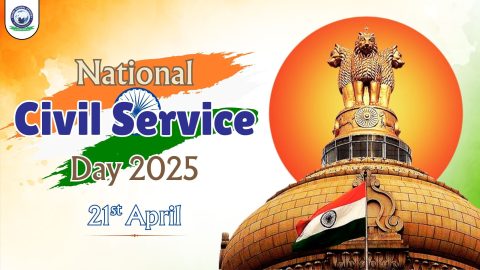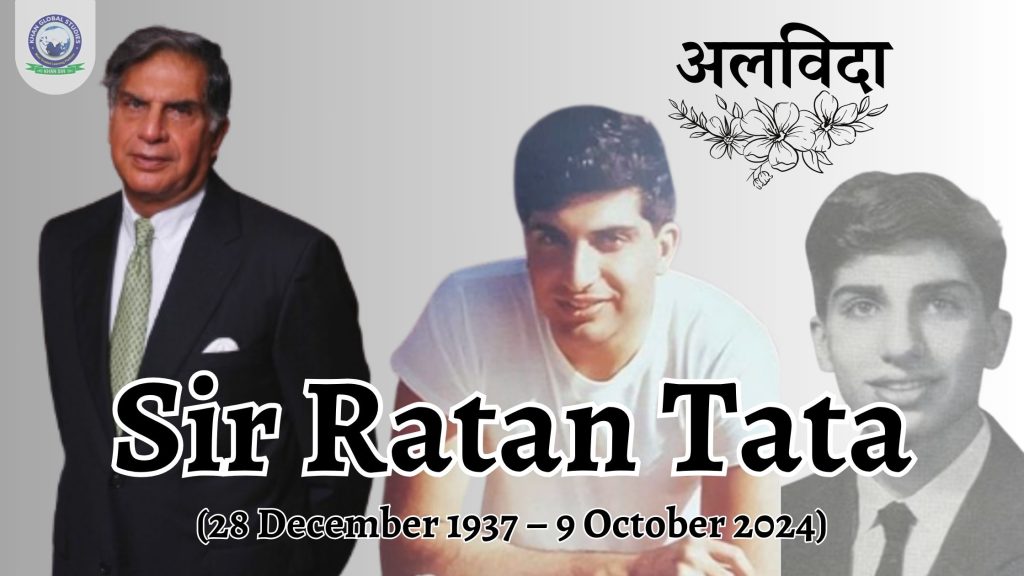Ratan Tata is counted among the most iconic and respected industrialists of India. His life is an inspirational saga, which includes struggle, discipline and dedication towards social service. If a biopic is made on his life, it will not only be the success story of the Tata Group, but it will also be the story of the development of Indian industry and society.
Introduction
Ratan Tata (28 December 1937 – 9 October 2024) was an Indian industrialist and philanthropist who served as chairman of the Tata Group and Tata Sons from 1991 to 2012, and then as interim chairman from October 2016 to February 2017. He was awarded India’s second highest civilian honour, the Padma Vibhushan, in 2008, and received the Padma Bhushan in 2000.
During Ratan Tata’s tenure, the Tata Group acquired Tetley, Jaguar Land Rover, and Corus, transforming Tata from an India-focused company to a global business. He was also a philanthropist and invested in over 30 startups personally and through his investment company.
Early Life
Ratan Tata was born on 28 December 1937 in Bombay (now Mumbai) to a Parsi Zoroastrian family, at a time when India was under British rule. He is the son of Naval Tata, who was born in Surat and was later adopted into the Tata family. Ratan Tata’s mother’s name was Sooni Tata, who was the niece of Jamsetji Tata, the founder of the Tata Group. Ratan Tata’s biological grandfather, Hormusji Tata, was a member of the Tata family.
His parents divorced in 1948 when Ratan Tata was 10 years old. Ratan Tata was raised by his grandmother Navajbai Tata, who was Ratanji Tata’s wife. Ratan Tata has a younger brother Jimmy Tata and a half-brother Noel Tata, who is from Naval Tata’s second marriage. This time was full of difficulties in his life, but he faced these difficulties with patience and restraint.
Education and Experience Abroad
Ratan Tata was educated at the Cathedral and John Connon School in Mumbai, Bishop Cotton School in Shimla, and Riverdale Country School in New York City, from which he graduated in 1955. He then enrolled at Cornell University, from which he graduated in 1959 with a bachelor’s degree in architecture and an Advanced Management Program from Harvard Business School.
After his education, he worked for some time in the US, where he understood the industry culture and management practices of Western countries.
While studying at Cornell, he became a member of the Alpha Sigma Phi fraternity. In 2008, he donated $50 million to Cornell, making him the university’s largest international donor.
Beginning of Career and Journey in Tata Group
Ratan Tata began his professional journey with the Tata Group in 1961. Initially, he got the opportunity to work on the shop floor of Tata Steel, where he worked at the grassroots level with the workers. His hard work and leadership skills soon allowed him to lead the group in major projects.
In the 1970s, Ratan Tata was given a managerial position in the Tata Group. He proved his management abilities by successfully reviving National Radio and Electronics (NELCO). Initially, he faced a tough challenge from the heads of the group’s various subsidiaries, which until then had been operating independently. In response, Ratan Tata implemented several policies to integrate the group’s structure, such as fixing retirement ages, making subsidiaries report directly to the group headquarters, and making all subsidiaries contribute profits to building the Tata Group brand.
In 1991, JRD Tata appointed him chairman of the Tata Group. By this time the Tata Group had split into several companies, but Ratan Tata re-integrated the group’s strategy and established it as a global brand. He took key brands like Tata Motors, Tata Consultancy Services, Tata Teleservices and Tata Tea to new heights.
Ratan Tata prioritised innovation and delegated responsibilities to young talent. Under his leadership, the overlap between Tata Group subsidiaries was reduced and the group embraced globalisation by exiting businesses that were not related to its core business.
Ratan Tata led the Tata Group for 21 years, during which the company’s revenue grew 40 times and profits 50 times. During his tenure, Tata Tea acquired Tetley, Tata Motors acquired Jaguar Land Rover and Tata Steel acquired Corus. These deals transformed the Tata Group from an Indian company to a global brand where more than 65% of revenue came from international markets.
Ratan Tata launched affordable cars like the Tata Nano, making it easier for ordinary Indians to afford a car. He also introduced the Tigor electric vehicle, giving impetus to India’s electric vehicle dream.
In 2012, at the age of 75, Ratan Tata resigned from the Tata Group. Controversy followed the appointment of his successor Cyrus Mistry, who was removed in 2017 and replaced by Natarajan Chandrasekaran as the chairman of Tata Sons.
Ratan Tata has also personally invested in several startups, such as Snapdeal, Ola, Teabox, CashKaro and the Chinese smartphone company Xiaomi, etc. He also launched a startup called “Goodfellow”, which works to promote friendship between the elderly and the youth.
Social Service and Generosity
Ratan Tata’s life has been filled with a deep commitment towards social service. About 66% of the Tata Group goes to Tata Trust, which works in the field of education, health and social service. Ratan Tata has also worked on many social issues personally. He supported startups in India and emphasized on job creation for the youth.
- Ratan Tata was a supporter of education, medicine, and rural development and was considered one of India’s leading philanthropists. He collaborated with the University of New South Wales to improve water quality.
- In 2018, the “Tata Hall” research center opened at UC San Diego with a $70 million donation by the Tata Trusts.
- A $28 million Tata Scholarship Fund for Cornell University students was also established.
- In 2010, the Tata Group donated $50 million to build “Tata Hall” at Harvard Business School.
- The Tata Innovation Center at Cornell Tech is also named after Ratan Tata.
- TCS donated $35 million to Carnegie Mellon University to research autonomous vehicles and cognitive systems.
- In 2014, the “Tata Center for Technology and Design” was established at IIT Bombay with ₹950 million.
- Tata Trusts gave a grant of ₹750 million to the Indian Institute of Science for research on Alzheimer’s disease.
- Also established the “Tata Center of Technology and Design” at MIT, which addresses problems of resource-limited communities.
Major Achievements
During Ratan Tata’s tenure, the Tata Group achieved many historic achievements. In 2008, he acquired the British motor company Jaguar Land Rover, which was a major achievement for the Indian automobile industry. Apart from this, Ratan Tata also launched the world’s cheapest car ‘Nano’, which reflects his approach towards simple and cheap products.
- Ratan Tata was awarded the Padma Bhushan by the Government of India in 2000.
- In 2008 he was awarded the Padma Vibhushan, India’s second highest civilian honour.
- In 2006 the Maharashtra government awarded him the “Maharashtra Bhushan” award for his contribution in the field of public administration in Maharashtra.
- In 2021 the Assam government awarded him the “Assam Baibhav” award for his contribution to cancer care in Assam.
Ratan Tata has been honoured with various awards and honours, the major ones of which are as follows:
- 2001: Honorary Doctorate in Business Administration – Ohio State University
- 2004:
- Oriental Republic of Uruguay Medal – Government of Uruguay
- Honorary Doctorate in Technology – Asian Institute of Technology
- 2005:
- International Distinguished Achievement Award – B’nai Brith International
- Honorary Doctorate in Science – University of Warwick
- 2006:
- Honorary Doctorate in Science – Indian Institute of Technology Madras
- Responsible Capitalism Award – First (for the Inspiration and Recognition of Science and Technology)
- 2007:
- Honorary Fellowship – London School of Economics and Political Science
- Carnegie Medal of Philanthropy – Carnegie Endowment for International Peace
- 2008:
- Honorary Doctorate in Law – University of Cambridge
- Honorary Doctorate in Science – Indian Institute of Technology Bombay and Indian Institute of Technology Kharagpur
- Honorary Citizen Award – Government of Singapore
- Honorary Fellowship – Institution of Engineering and Technology
- Inspired Leadership Award – Performing Theatre
- 2009:
- Honorary Knight Commander of the British Empire (KBE) – Queen Elizabeth II
- Lifetime Contribution Award in Engineering – Indian National Academy
- Grand Officer of the Order of Merit – Government of Italy
- 2010:
- Honorary Doctorate in Law – University of Cambridge
- Hadrian Prize – World Monuments Fund
- Oslo Business for Peace Award – Business for Peace Foundation
- Legend in Leadership Award – Yale University
- 2012:
- Honorary Fellow – Royal Academy of Engineering
- Degree of Business Honoris Causa – University of New South Wales
- Grand Cordon of the Order of the Rising Sun – Government of Japan
- 2013:
- Foreign Associate – National Academy of Engineering
- Transformational Leader of the Decade – Indian Affairs India Leadership Summit
- Ernst & Young Entrepreneur of the Year – Lifetime Achievement
- 2014:
- Honorary Doctorate in Business – Singapore Management University
- Sayaji Ratna Award – Baroda Management Association
- Honorary Knight Grand Cross of the Order of the British Empire (GBE) – Queen Elizabeth II
- 2015: Honorary Doctorate in Automotive Engineering – Clemson University
- 2016: Commander of the Legion of Honour – Government of France
- 2018: Honorary Doctorate in Engineering – Swansea University
- 2022: Honorary Doctorate in Literature – HSNC University
- 2023:
- Honorary Officer of the Order of Australia (AO) – King Charles III
- Maharashtra Udyog Ratna – Government of Maharashtra
Journey After Retirement
Ratan Tata retired as the chairman of the Tata Group in 2012, but he remains active in social work and philanthropy. He is still associated with the Tata Trusts and continues his generous work.
Death
On 7 October 2024, Ratan Tata was admitted to Breach Candy Hospital in a critical condition, where he was kept under the observation of doctors. He died on the night of 9 October 2024 at the age of 86. After his death, the Maharashtra government declared a day of mourning.
Conclusion
Ratan Tata’s story is an example of Indian industry, entrepreneurship and social service. Making his biopic will not only be a significant step for Indian cinema but will also be a source of inspiration for everyone. Ratan Tata’s biopic will be the story of a man who did not compromise on his values and principles even in adverse circumstances. It will not only show his business journey but will also highlight his struggles, awareness of social issues and his contribution to Indian industry. The film will be a source of inspiration for the younger generation who can learn from Ratan Tata’s leadership and the heights he has reached.



